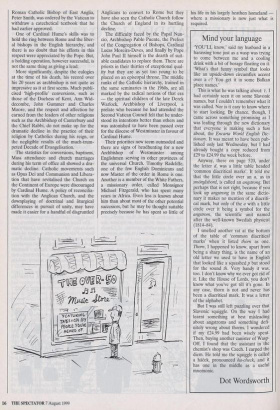Mind your language
'YOU'LL know,' said my husband in a harassing tone just as a wasp was trying to come between me and a cooling drink with a bit of borage floating on it. 'What's that funny symbol that looks like an upside-down circumflex accent over a c? You get it in some Balkan place names.'
This is what he was talking about:'6. I had certainly seen it on some Slavonic names, but I couldn't remember what it was called. Nor is it easy to know where to start looking. By chance, though, I came across something promising as I was leafing through the new dictionary that everyone is making such a fuss about, the Encarta World English Dic- tionary. It was meant to have been pub- lished only last Wednesday, but I had already bought a copy reduced from £29 to £24.99 the week before.
Anyway, there on page 520, under the letter d, was a little table headed 'common diacritical marks'. It told me that the little circle over an a, as in smOrgdsbord, is called an angstrong. But perhaps that is not right, because if you look up angstrong in the same dictio- nary it makes no mention of a diacriti- cal mark, but only of the a with a little circle over it being a symbol for the angstrom, the scientific unit named after the well-known Swedish physicist (1814-84).
I smelled another rat at the bottom of the table of 'common diacritical marks' when it listed thorn as one. Thorn, I happened to know, apart from being a sharp thing, is the name of an old letter we used to have in English that looked like a squashed p but stood for the sound th. Very handy it was, too. I don't know why we ever got rid of it. Like the House of Lords, you don't know what you've got till it's gone. In any case, thorn is not and never has been a diacritical mark. It was a letter of the alphabet.
But I was still left puzzling over that Slavonic squiggle. On the way I had learnt something at best misleading about angstroms and something defi- nitely wrong about thorns. I wondered if my £24.99 had been wisely spent. Then, buying another canister of Wasp- Off, I found that the assistant in the chemist's shop was Czech. 1 carped the diem. He told me the squiggle is called a hadek, pronounced ha-cheek, and it has one in the middle as a useful mnemonic.
Dot Wordsworth


























































 Previous page
Previous page